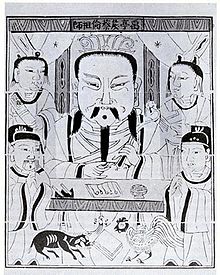Cai Lun
| Cai Lun | |||||||||||||||||||||||
|---|---|---|---|---|---|---|---|---|---|---|---|---|---|---|---|---|---|---|---|---|---|---|---|

An 18th-century Qing dynasty print depicting Cai Lun as the patron of paper making
|
|||||||||||||||||||||||
| Born | 48 Guiyang (today Leiyang), China |
||||||||||||||||||||||
| Died | 121 (aged 73) Han Palace of Luoyang, now Luoyang, Henan Province, China |
||||||||||||||||||||||
| Chinese name | |||||||||||||||||||||||
| Traditional Chinese | 蔡倫 | ||||||||||||||||||||||
| Simplified Chinese | 蔡伦 | ||||||||||||||||||||||
|
|||||||||||||||||||||||
| Transcriptions | |
|---|---|
| Standard Mandarin | |
| Hanyu Pinyin | Cài Lún |
| Wade–Giles | Ts'ai4 Lun2 |
| IPA | [tsʰâi̯ lu̯ə̌n] |
| Yue: Cantonese | |
| Yale Romanization | Choi Lèuhn |
| Jyutping | Coi3 Leon4 |
| Southern Min | |
| Hokkien POJ | Chhoà Lûn |
| Tâi-lô | Tshuà Lûn |
Cai Lun ([tsʰâi̯ lu̯ə̌n]; Chinese: 蔡倫; AD 48– 121), courtesy name Jingzhong (敬仲), was a Han dynasty Chinese eunuch and official. He is traditionally regarded as the inventor of paper and the papermaking process, in forms recognizable in modern times as paper (as opposed to papyrus). Although early forms of paper had existed in China since the 2nd century BC, he was responsible for the first significant improvement and standardization of paper-making by adding essential new materials into its composition.
Cai Lun (蔡伦) was born in Guiyang (modern day Leiyang, Hunan) during the Eastern Han Dynasty. After castration followed by serving as a court eunuch from AD 75, he was given several promotions under the rule of Emperor He of Han. In AD 89 he was promoted with the title of Shang Fang Si, an office in charge of manufacturing instruments and weapons; he also became a Regular Palace Attendant (中常侍). He was involved in palace intrigue as a supporter of Empress Dou, and in the death of her romantic rival, Consort Song. After the death of Empress Dou in AD 97, he became an associate of Consort Deng Sui.
In A.D. 105, Cai invented the composition for paper along with the papermaking process—though he may have been credited with an invention of someone from a lower class. There is also a legend that says Cai received inspiration for making paper from watching paper wasps make their nests. Tools and machinery of papermaking in modern times may be more complex, but they still employ the ancient technique of felted sheets of fiber suspended in water, draining of the water, and then drying into a thin matted sheet. For this invention Cai would be world-renowned posthumously, and even in his own time he was given recognition for his invention. A part of his official biography written later in China read thus (Wade–Giles spelling):
...
Wikipedia
